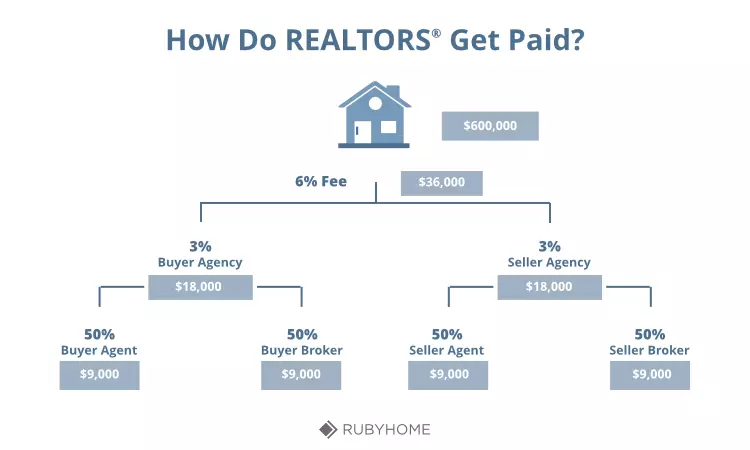 Who pays Realtors
Who pays Realtors
Have you ever wondered how real estate agents make money? Most people don't give it much thought, but it's an important aspect to understand, whether you're buying or selling a property. In this article, we'll dive into the details of how realtors get paid and shed light on the commission structure that drives their earnings.
Real Estate Commissions: Who Pays and How Much?
Realtors work on a commission basis, typically receiving 5 to 6 percent of a home's sales price. This commission is split between the listing broker and the buyer's agent. While sellers bear the cost of fees, buyers generally don't pay anything to their agent.
 Real Estate Commission Chart
Real Estate Commission Chart
It's important to note that this is the most common practice, although some agents may represent buyers for a flat fee or an hourly charge. However, such business models are rare.
Understanding Real Estate Commissions: An Example
To illustrate how real estate commissions work, let's consider a scenario. The seller and their listing agent agree on a 6% commission rate. This percentage is outlined in a listing agreement that specifies the agent's responsibilities, such as marketing the property.
The listing agent then takes pictures of the home, writes a compelling description, and uploads these details to the Multiple Listing Service (MLS). The MLS acts as a marketplace for home inventory within a specific region, allowing member agents to access additional information, including the commission split offered to buyer representatives.
When a potential buyer's agent shows the listed home to their client, and the client decides to purchase it, an offer is made using a residential purchase agreement along with an earnest money deposit. Assuming the negotiation process goes smoothly, the deal progresses to the closing stage.
During the closing, an escrow company, acting as a neutral third party, handles all the financial transactions. The listing fee is deducted from the proceeds of the sale, and the remaining funds are disbursed to the respective companies for whom the agents work.
Brokerage and Commission Splits
While agents may be self-employed, they operate under the licenses of their brokers. In addition to the listing broker and the buyer's agent, there are two more entities involved in the transaction. The commission is split between the brokers, typically ranging from 25% to 50%, based on an agreement between them.
Responsibilities of Real Estate Agents
Listing Agents/Brokers
Listing agents represent sellers and hold the legal listing of a property. They typically charge a fee of 5% to 6% to list and market a home, although prices can vary by market. It's important to note that colluding or fixing listing fees violates antitrust laws.
Listing agents deploy various marketing and advertising strategies, including print publications, personal and office websites, international syndication, billboards, internet advertising, and more. Additionally, they handle tasks like property photography, video creation, copywriting, open houses, and home staging.
Buyer's Agents
Buyer's agents, on the other hand, represent buyers and receive a portion of the listing fee as their commission. Like listing agents, they also incur marketing and advertising expenses to attract customers and increase market share.
Dual Agency: A Tricky Situation
In some cases, a listing agent may also represent a buyer for the same property, known as dual agency. However, several states prohibit this practice due to the potential conflict of interest. In states where it is allowed, such as California, full disclosure to both the buyer and seller is required.
Final Thoughts on Realtor Pay
Becoming a realtor involves numerous responsibilities and expenses that eat into their seemingly wonderful profits. Marketing is an essential part of their business, and it's crucial to be cautious in dual agency situations.
Understanding how realtors get paid and the intricacies of commission splits can help buyers and sellers navigate the real estate market with confidence. By knowing the process, you'll be better equipped to make informed decisions and choose the right agent to represent your interests.

















